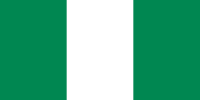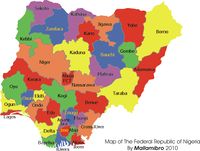Nigeria
| Work in progress, expect frequent changes. Help and feedback is welcome. See discussion page. |
Contents
Country Profile
LOCATION:
The Federal Republic of Nigeria is located on the West Coast of Africa with 36 states and a recorded population of over 120 million people. Of this population, 30 million are students. The country is rich in petroleum and many other natural resources. The three dominant tribes are Yoruba in the southwest, Ibo in the eastern region and Hausa in the north. Although people speak their native languages, the official language is English. The dominant two religions are Christianity and Islam. Nigeria is situated on the west coast of Africa, lies on latitudes 4° north of the Equator and latitudes 3° and 14° on the east of the Greenwich Meridian. Shares boundaries with The Republics of Benin and Niger in the west, Cameroon in the East, Niger and Chad in the north and the Gulf of Guinea in the South.
Nigeria gained it’s independence from the British in 1960. For most its Post-independence years, it was been under military rule. During this period, the educational system suffered, it was plagued with riots and strikes resulting in a decline in quality of the educational system. Educational institutions are still in the process of recuperating from the neglect of the former governments, though a lot still needs to be done for Nigeria to regain its lost place of glory. It had in the past produced a lot of academicians ands professionals in varoius fields of human endeavour.
Area:
923,768.64sq. Kilometers
Capital:
Abuja
Population:
About 155 Million People
Official Language:
English (Official)About 450 Indigenous languages with Hausa, Igbo and Yoruba being the most widely spoken. Others include Fulfulde, Ijaw, Tiv, Edo, Jukun, Gbagyi, Idoma, Igala, Nupe, Etsako, Ebirra, Kanuri, Kalabari, Esan, Kamberi, Shuwa Arab, Bajju, and Tarok to mention but a few.
National Day:
October 1st (Got independence from Great Britain in 1960)
Currency:
Naira=100 kobo
Time:
GMT + 1Hour
Weights sand Measures:
Metric
Political Structure:
Three-tier structure:
Federal Government
States
774 Local Governments
Main Commecial/Industrial Cities:
Lagos, Port Harcourt, Kano, Onitsha, Ibadan, Aba, Jos, Warri, Maiduguri, Kaduna, Abuja FCT, Nnewi, Sango Otta, Benin City, etc.
EDUCATION PROFILE
Introduction:
The Nigeria's philosophy on education according to the constitution is based on the development of the individual into a sound and effective citizen and the provision of equal educational opportunities for all citizens of the nation at the primary, secondary and tertiary levels both inside and outside the formal school system. The language of instruction in Nigerian institutions is English. The Federal Ministry of Education is the government body charged with the duty of regulating procedures and maintaining standards in all educational institutions across the country.
Primary School
Primary education begins at the age of six for the majority of Nigerians. Students spend six years in primary school and graduate with a First School Leaving Certificate. Subjects taught at the primary level include Mathematics, English language, Islamic religions studies, science and one of the three main native languages (Yoruba, Hausa and Ibo). Some Privately owned primary schools also offer computer science, French and art. Primary school students are required to take a Common Entrance Examination to qualify for admission into the Federal and State Government schools. Private Secondary schools organize their entrance examinations individually though State Ministries of education monitor the standards Nigerian
Universities
- Abubakar Tafawa Balewa University, Bauchi
- Ahmadu Bello University, Zaria Professor Ibrahim Garba; http://www.abu.edu.ng est 1962
- Bayero University, Kano Professor Yahuza Muhammad Bello; http://www.buk.edu.ng est 1975
- Federal University Gashua, Yobe Prof. Andrew Haruna; http://www.fugashua.edu.ng est 2013
- Federal University of Petroleum Resources, Effurun; Prof. Akii Ibhadode http://www.fupre.edu.ng est 2007
- [[Federal University of Technology, Akure Prof. Adebiyi Gregory Daramola http://www.futa.edu.ng est 1981
- [[Federal University of Technology, Minna Professor Musibau Adewunmi Akanji http://www.futminna.edu.ng est 1982]]
- Federal University of Technology, Owerri Prof. Chigozie C. Asiabaka; http://www.futo.edu.ng est 1980
- Federal University, Dutse, Jigawa State Professor Fatima Batoul Muktar http://www.fud.edu.ng est 2011
- Federal University, Dutsin-Ma, Katsina Professor Haruna Abdu Kaita http://www.fudutsinma.edu.ng est 2011
- Federal University, Kashere, Gombe State Prof. Alhassan Mohammed Gani http://www.fukashere.edu.ng est 2011
- [[Federal University, Lafia, Nasarawa State Professor Muhammad Sanusi Liman http://www.fulafia.edu.ng est 2011]]
- Federal University, Lokoja, Kogi State Professor Angela Freeman Miri http://www.fulokoja.edu.ng est 2011
- Federal University, Ndifu-Alike, Ebonyi State Professor Chinedum Nwajiuba http://www.funai.edu.ng est 2011
- [[Federal University, Otuoke, Bayelsa Professor Seth Accra Jaja http://www.fuotuoke.edu.ng est 2011]]
- Federal University, Oye-Ekiti, Ekiti State Prof. Kayode Soremekun http://www.fuoye.edu.ng est 2011
- [[Federal University, Wukari, Taraba State Professor Mohammed Kundiri http://www.fuwukari.edu.ng 2011]]
- Federal University, Birnin Kebbi Prof. Auwal H Yadudu; http://www.fubk.edu.ng est 2013
- Federal University, Gusau Zamfara Prof. Magaji Garba; http://www.fugus.edu.ng est 2013
- Michael Okpara University of Agricultural Umudike Professor Francis O Otunta; http://www.mouau.edu.ng est 1992
- Modibbo Adama University of Technology, Yola Professor Kyari Mohammed; http://www.mautech.edu.ng est 1981
- National Open University of Nigeria, Lagos Professor Abdalla Uba Adamu http://www.nou.edu.ng est 2002
- Nigeria Police Academy Wudil Professor Munzali Jibril; http://www.npf.gov.ng est 2013
- Nigerian Defence Academy Kaduna Professor S.O Okeniyi; http://www.nda.edu.ng est 1985
- Nnamdi Azikiwe University, Awka Professor Joseph E. Ehaneku; http://www.unizik.edu.ng est 1992
- Obafemi Awolowo University, Ile-Ife Ag. Prof Anthony Elujoba http://www.oauife.edu.ng est 1962
- University of Abuja, Gwagwalada Professor Machael Umale Adikwu https://www.uniabuja.edu.ng/ est 1988
- [[University of Agriculture, Abeokuta Professor O. B. Oyewole http://www.unaab.edu.ng est 1988]]
- [[University of Agriculture, Makurdi Prof. Emmanuel I. Kucha http://www.uam.edu.ng est 1988]]
- [[University of Benin Professor Faraday Orumwense http://www.uniben.edu.ng est 1970]]
- University of Calabar Prof. Zana Itinube Akpagu; http://www.unical.edu.ng est 1975
- [[University of Ibadan Professor Abel Idowu Olayinka http://www.ui.edu.ng est 1948]]
- [[University of Ilorin Professor Abdulganiyu Ambali http://www.unilorin.edu.ng est 1975]]
- University of Jos Prof. Sebastian Maimako; http://www.unijos.edu.ng est 1975
- [[University of Lagos Prof. Rahman A. Bello http://www.unilag.edu.ng est 1962]]
- [[University of Maiduguri Professor Ibrahim A. Njodi http://www.unimaid.edu.ng est 1975]]
- [[University of Nigeria, Nsukka Professor Charles Arinzechukwu Igwe, http://www.unn.edu.ng est 1960]]
- [[University of Port-Harcourt Professor Ndowa N Lale http://www.uniport.edu.ng est 1975]]
- [[University of Uyo Professor Enefiok Essien http://www.uniuyo.edu.ng est 1991]]
- Usumanu Danfodiyo University Sokoto Professor Abdullahi Audu Zuru, http://www.udusok.edu.ng est 1975
WIKIEDUCATORS
- Maureen Matheny School, Niger Delta
- Bukola James (talk) 19:03, 1 February 2023 (NZDT) Certified trainer of Reading Wikipedia in the Classroom Nigeria.
- Felix Kayode Olakulehin Regional Training and Research Institute for ODL, National Open University of Nigeria
- Professor Babatunde Ipaye Directorate of Learner Support Services, National Open University of Nigeria
- Ibrahim Oyekanmi Mallamibro Information Technology Academy, Kano, Nigeria
- Abdulmalik Yusuf Ofemile University of Nottingham, U K/ FCT College of Education, Zuba Abuja
- Auwalu Inuwa Diso Publisher, e-Reading Newsletter, Disoweb Nigeria Limited, Kano
- Yahaya Abdullahi ATBU Bauchi/ FCE Potiskum
- Opeyemi Dahunsi Open Educational Resources Unit/ National Open University of Nigeria
- Jude E. Onwugbaramuko, Founder Prudent Heart Care Foundation Inc.|Global Goodwill Ambassador | Clinical Instructor |Author
- Chris Prince Udochukwu Njoku, Ph.D. Computer Communications Centre, University of Nigeria; Coordinator, RICTHE Africa (for advocacy, research, training, innovation & community projects for use of ICT & OER in education, library services & healthy living

